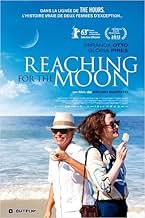IMDb रेटिंग
7.0/10
3.7 हज़ार
आपकी रेटिंग
अपनी भाषा में प्लॉट जोड़ेंA chronicle of the tragic love affair between American poet Elizabeth Bishop and Brazilian architect Lota de Macedo Soares.A chronicle of the tragic love affair between American poet Elizabeth Bishop and Brazilian architect Lota de Macedo Soares.A chronicle of the tragic love affair between American poet Elizabeth Bishop and Brazilian architect Lota de Macedo Soares.
- पुरस्कार
- 9 जीत और कुल 21 नामांकन
फ़ीचर्ड समीक्षाएं
Glória Pires, as Lota de Macedo Soares, dominates this film to such a degree, we wonder why it's focus is the poet Elizabeth Bishop, brittlely acted by Miranda Otto. I suppose you could argue, "That's how it was both in life and their relationship," but as a viewer, our interest begs to know more about Soares.
This is a beautiful film about very talented, privileged people. An icey, supposedly repressed Bishop finds herself in the hot house of the Brazilian estate of Soares. Their torrid relationship is the subject of the film. We forget how dangerous same sex relationships were at the time, and film doesn't try to recreate that peril. And that makes some of the dynamics that plague the relationship a question. Why is Bishop able to sail above disastrous break-up; why is Soares destroyed.
What is fascinating is the liberation that the Soares estate, Petrópolis, provides. It's an Eden-like setting where the relationship flourishes. But we want more than "extraordinary people" have the same challenges in relationships as we, the ordinary. When Pulitzer Prises or major architectural commissions are awarded, the changes in dymanics that it brings aren't really explored. And I think these extraordinaryly talented people deserve a deeper, perhaps darker, film given the times they lived in and pressures it brought.
This is a beautiful film about very talented, privileged people. An icey, supposedly repressed Bishop finds herself in the hot house of the Brazilian estate of Soares. Their torrid relationship is the subject of the film. We forget how dangerous same sex relationships were at the time, and film doesn't try to recreate that peril. And that makes some of the dynamics that plague the relationship a question. Why is Bishop able to sail above disastrous break-up; why is Soares destroyed.
What is fascinating is the liberation that the Soares estate, Petrópolis, provides. It's an Eden-like setting where the relationship flourishes. But we want more than "extraordinary people" have the same challenges in relationships as we, the ordinary. When Pulitzer Prises or major architectural commissions are awarded, the changes in dymanics that it brings aren't really explored. And I think these extraordinaryly talented people deserve a deeper, perhaps darker, film given the times they lived in and pressures it brought.
This is a beautifully filmed movie about the lives of two exceptional women whose lives collided in the early 50s and went on for 17 years. Oh - it's a true story, BTW.
The locations are spectacular in a quiet way and worth the watch on their own. They added one star.
I am ashamed to say I was not aware of Elizabeth Bishop. Now I am looking forward to reading her material.
Hope you enjoy this film.
The locations are spectacular in a quiet way and worth the watch on their own. They added one star.
I am ashamed to say I was not aware of Elizabeth Bishop. Now I am looking forward to reading her material.
Hope you enjoy this film.
Lovely. A story here that is not overshadowed by the relationships, politics, or agenda. It is, simply beautifully filmed, the beaches of Rio De Janeiro, the beautiful home Lota has deigned in part to accommodate her new lover, poet Elizabeth Bishop, completely played by Miranda Otto.
Otto is at once restrained yet yearning, a Vassar graduate visiting her friend, who initially is puzzled (and indeed overwhelmed) by the beauty and passion of South America.
She plays the American New England spinster type well, without a stereotype here. We can feel she wants, and NEEDS to break free from societal restraints.
The filming of the rain forests, the owls at night, the visuals are incredible. Lota Soares was politically connected and designed the park near Carioca beach, the title infers, reaching for the moon has so may more connotations for each woman.
What is most refreshing is the way this film is written, sensitive to the issues each woman experiences, it is an individual and a private journey.
The actress portraying Carlotta Soares is affecting and sad, and Miranda Otto is quite believable as Bishop. The story is beautiful and sad, and the scenery of Brazil is not to be missed, simply beautiful, and beautifully filmed. 10/10
Otto is at once restrained yet yearning, a Vassar graduate visiting her friend, who initially is puzzled (and indeed overwhelmed) by the beauty and passion of South America.
She plays the American New England spinster type well, without a stereotype here. We can feel she wants, and NEEDS to break free from societal restraints.
The filming of the rain forests, the owls at night, the visuals are incredible. Lota Soares was politically connected and designed the park near Carioca beach, the title infers, reaching for the moon has so may more connotations for each woman.
What is most refreshing is the way this film is written, sensitive to the issues each woman experiences, it is an individual and a private journey.
The actress portraying Carlotta Soares is affecting and sad, and Miranda Otto is quite believable as Bishop. The story is beautiful and sad, and the scenery of Brazil is not to be missed, simply beautiful, and beautifully filmed. 10/10
The Brazilian movie Flores Raras was shown in the United States with the title Reaching for the Moon (2013). It was directed by Bruno Barreto.
The film is based on the life of the great American poet, Elizabeth Bishop (Miranda Otto). As the movie begins, Elizabeth is traveling in Brazil, and visits the estate of the famous architect Lota de Macedo Soares, played by Glória Pires. Lota is in a lesbian relationship with Bishop's college friend Mary (Tracy Middendorf).
Despite Elizabeth's somewhat proper and restricted outlook, she accepts the love offered by Lota, even though this leaves Mary as the odd woman out. This act struck me as a shabby betrayal of an old friend, but, in the movie, it's treated as true love that makes such betrayal acceptable, if not inevitable.
It doesn't hurt that Lota has an enormous estate, and enormous resources. As an architect, Lota is able to envision and then design a beautiful writer's studio for Elizabeth.
The strong point of the movie is that it presents the writing of poetry as work. Elizabeth doesn't just close her eyes and wait until the poetic muse strikes her. She sits in the studio and pushes and pulls her poetry into shape. She's also not happy when she's interrupted during the creative process. This is the only film I can remember where creating a poem is shown as a process, and a delicate and difficult process at that.
This idyllic existence is disrupted by Brazilian political events, into which Lota plunges. The remainder of the movie is devoted to how these events play out in the lives of Elizabeth and Lota.
I don't know enough about the details of the coup, or of the lives of the film's principals, to know how accurately the film portrays them. This aspect of the movie is highly melodramatic, but the actual events were probably equally melodramatic. Certainly, the film holds your interest as the situation plays itself out to the end.
We saw this movie on the large screen, where it will work better, especially in the scenes set on Lota's estate. However, it will work well enough on the small screen. It's not a great movie, but it's certainly good enough to repay you for finding and watching it.
The film is based on the life of the great American poet, Elizabeth Bishop (Miranda Otto). As the movie begins, Elizabeth is traveling in Brazil, and visits the estate of the famous architect Lota de Macedo Soares, played by Glória Pires. Lota is in a lesbian relationship with Bishop's college friend Mary (Tracy Middendorf).
Despite Elizabeth's somewhat proper and restricted outlook, she accepts the love offered by Lota, even though this leaves Mary as the odd woman out. This act struck me as a shabby betrayal of an old friend, but, in the movie, it's treated as true love that makes such betrayal acceptable, if not inevitable.
It doesn't hurt that Lota has an enormous estate, and enormous resources. As an architect, Lota is able to envision and then design a beautiful writer's studio for Elizabeth.
The strong point of the movie is that it presents the writing of poetry as work. Elizabeth doesn't just close her eyes and wait until the poetic muse strikes her. She sits in the studio and pushes and pulls her poetry into shape. She's also not happy when she's interrupted during the creative process. This is the only film I can remember where creating a poem is shown as a process, and a delicate and difficult process at that.
This idyllic existence is disrupted by Brazilian political events, into which Lota plunges. The remainder of the movie is devoted to how these events play out in the lives of Elizabeth and Lota.
I don't know enough about the details of the coup, or of the lives of the film's principals, to know how accurately the film portrays them. This aspect of the movie is highly melodramatic, but the actual events were probably equally melodramatic. Certainly, the film holds your interest as the situation plays itself out to the end.
We saw this movie on the large screen, where it will work better, especially in the scenes set on Lota's estate. However, it will work well enough on the small screen. It's not a great movie, but it's certainly good enough to repay you for finding and watching it.
Overall had a very good impression of the movie. I think it balanced well certain aspects... especially in the portrayal of their romance. They avoided being overly prudish and that made the romance seem more real. Without getting too kinky and losing focus. The contrast between the two characters is really interesting.
The actress Gloria Pires who portrays Lota de Macedo Soares has worked in dozens of soap operas and that sometimes comes through in her films, but not this time thankfully. She so embodies the force of nature that was Lota and this comes through the screen very well. I felt like I was seeing a member of my old Rio family... so her amazing portrayal was certainly the highlight of the film for me.
PS: Being a Macedo Soares myself (but too young to have known Lota)... there might be a bit of bias in my review.
The actress Gloria Pires who portrays Lota de Macedo Soares has worked in dozens of soap operas and that sometimes comes through in her films, but not this time thankfully. She so embodies the force of nature that was Lota and this comes through the screen very well. I felt like I was seeing a member of my old Rio family... so her amazing portrayal was certainly the highlight of the film for me.
PS: Being a Macedo Soares myself (but too young to have known Lota)... there might be a bit of bias in my review.
क्या आपको पता है
- ट्रिवियाFour paragraphs appear between the end of the film and the beginning of the credits.
1. "Few women write major poetry. Only four stand with our best men: Emily Dickinson, Marianne Moore, Elizabeth Bishop and Sylvia Plath." - Robert Lowell
2. "I'd rather be called the 'The 16th Poet' with no reference to my sex, than one of 4 women - even if the other three are pretty good." - Elizabeth Bishop
3. Elizabeth Bishop died in 1979 in the United States. She is considered on the most important poets of the English language.
4. In 2012, UNESCO declared the city of Rio De Janeiro a World Heritage site. The Flamengo Park is one of its main attractions.
- गूफ़Opening in 1951 but Bobby Vinton singing Blue Velvet was not until 1963.
- भाव
Elizabeth Bishop: It's OK. I'm not drunk. I'm just crying in English.
- क्रेज़ी क्रेडिटNine of the main performers (the first 10) are listed in the credits without the name of their character. Only Treat Williams is credited as his character, Robert Lowell.
- कनेक्शनReferenced in Programa do Jô: 26 अगस्त 2013 को प्रसारित एपिसोड (2013)
टॉप पसंद
रेटिंग देने के लिए साइन-इन करें और वैयक्तिकृत सुझावों के लिए वॉचलिस्ट करें
- How long is Reaching for the Moon?Alexa द्वारा संचालित
विवरण
- रिलीज़ की तारीख़
- कंट्री ऑफ़ ओरिजिन
- आधिकारिक साइटें
- भाषाएं
- इस रूप में भी जाना जाता है
- Reaching for the Moon
- फ़िल्माने की जगहें
- उत्पादन कंपनियां
- IMDbPro पर और कंपनी क्रेडिट देखें
बॉक्स ऑफ़िस
- US और कनाडा में सकल
- $45,502
- US और कनाडा में पहले सप्ताह में कुल कमाई
- $14,573
- 10 नव॰ 2013
- दुनिया भर में सकल
- $15,34,391
- चलने की अवधि
- 1 घं 58 मि(118 min)
- रंग
- पक्ष अनुपात
- 1.85 : 1
इस पेज में योगदान दें
किसी बदलाव का सुझाव दें या अनुपलब्ध कॉन्टेंट जोड़ें






























